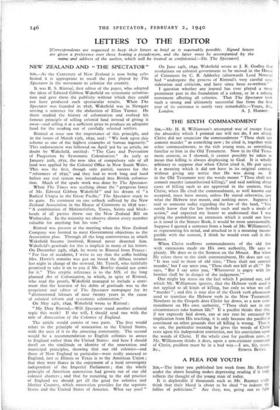LETTERS TO THE EDITOR
[Correspondents are requested to keep th.;ir letters as brief as is reasonably possible. Signed letters are given a preference over those bearing a pseudonym, and the latter must be accompanied by the name and address of the author, which will be treated as confidential.—ED. The Spectator]
NEW ZEALAND AND THE SPECTATOR"
Slit,—As the Centenary of New Zealand is now being cele- brated it is appropriate to recall the part played by The Spectator in the movement to colonise the country.
It was R. S. Rintoul, first editor of the paper, who adopted the ideas of Edward Gibbon Wakefield on systematic colonisa- tion and gave them the publicity without which they conld not have produced such spectacular results. When The Spectator was founded in 1828, Wakefield was in Newgate serving a sentence for the abduction of Ellen Turner. He there studied the history of colonisation and evolved his famous principle of selling colonial land instead of giving it away—and selling it at a sufficient price to produce an adequate fund for the sending out of carefully selected settlers.
Rintoul at once saw the importance of this principle, and in the issues of March 13th, 1830, said : "We look upon this scheme as one of the highest triumphs of human ingenuity." This endorsement was followed on April 3rd by an article, no doubt by Wakefield, entitled : "The Cure and Prevention of Pauperism by Systematic Colonisation." As early as January 20th, 1831, the new idea of compulsory sale of all land was applied by the Colonial Office in New South Wales. This was the first, though only partial, success for the "reformers of 1830," and they had to work long and hard before any real system was introduced into British colonisa- tion. Much of the spade work was done by The Spectator.
When The Times was scathing about the "gorgeous fancy of Mr. Edward Gibbon Wakefield" and his dream of "a Radical Utopia in the Great Pacific," The Spectator stuck to its guns. Its comment on one setback suffered by the New Zealand Association in the House of Commons in 1838 was : "A combination of Ministerialists, Tories, Saints and block- heads of all parties threw out the New Zealand Bill on Wednesday. In the minority we observe almost every member valuable for anything but his vote."
Rintoul was present at the meeting when the New Zealand Company was formed to meet Government objections to the Association plan. Through all the long controversies in which Wakefield became involved, Rintoul never deserted him. Wakefield's gratitude for this is implicit in many of his letters. On December 24th, 1848, he wrote to Rintoul from France : "For fear of accidents, I write to say that the coffin holding Mrs. Harris's remains was put on board the Albion steamer last night in charge of the steward, Mr. Tyrrell, who faithfully promised to take it on to you if Mr. Bowler should not come for it." This cryptic reference is to the MS. of the long planned Art of Colonisation, in which, in spite of Rintoul, who read the proofs, Wakefield managed to include a state- ment that the heaviest of his debts of gratitude was to the proprietor and editor of The Spectator newspaper for its "disinterested labours of near twenty years in the cause of colonial reform and systematic colonisation."
On May 14th, 1849, Wakefield wrote to Rintoul
"My Dear Rintoul,—Will Spectator stand another colonial topic this week? If she will, I should send one with the title of Annexation of the Colonies of England.
The artiCle would consist of two parts. The first would relate to the principle of annexation to the United States, with the uses of it to the annexing community. The second
would be a recommendation to English colonies to annex to England rather than the United States : and here I should
dwell on the similitude or identity of the annexation and municipal principles, showing that our old colonies—and those of New England in particular—were really annexed to England, just as Illinois or Texas is to the American Union ;
that they were States in the enjoyment of a local sovereignty independent of the Imperial Parliament ; that the whole
principle of American annexation had grown out of our old colonial charters ; and that by recurring to the old practice of England we should get all the good for colonies and Mother Country, which annexation provides for the separate States and the United States of America. What say you? "
On June 24th, 1849, Wakefield wrote to J. R. Godley that resolutions on colonial government to be moved in the House of Commons by C. B. Adderley (afterwards Lord Norton) had "undergone the process of Rintoul's very careful con- sideration and criticism, and have since been re-written."
I question whether any journal has ever played a more prominent part in the foundation of .a colony, or in a reform movement affecting all colonies. That The Spectator took such a strong and ultimately successful line from the first year of its existence is surely very remarkable.—Yours, &c.,






































 Previous page
Previous page